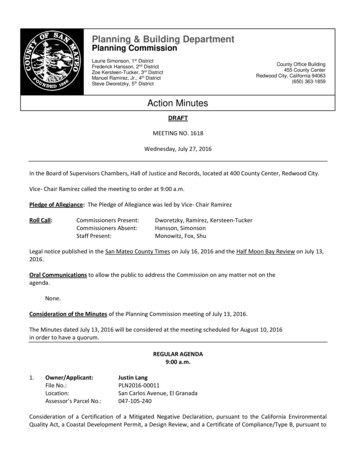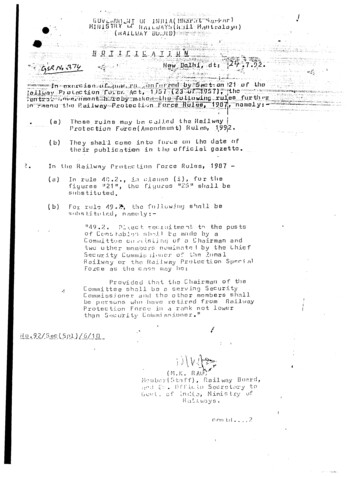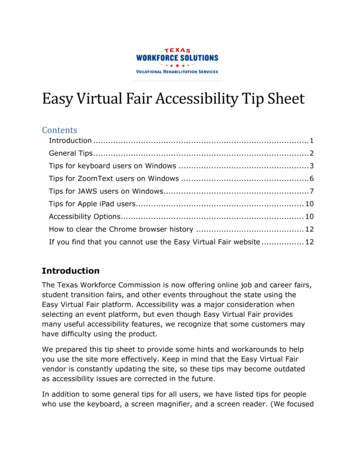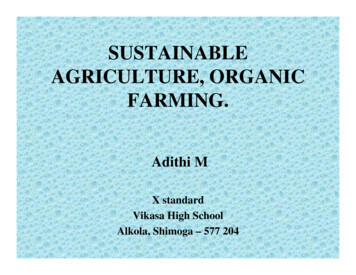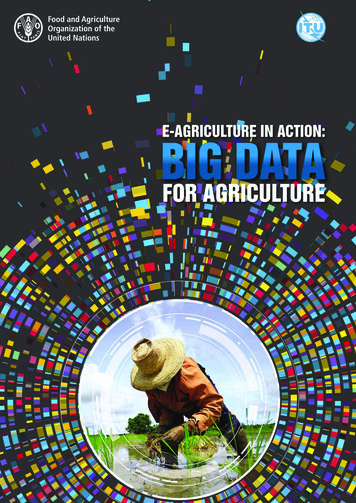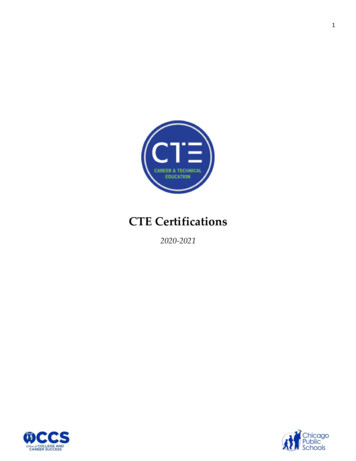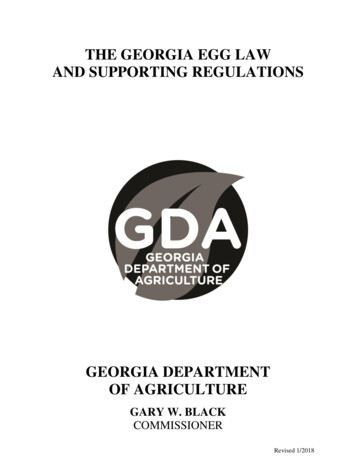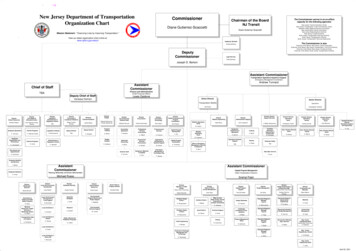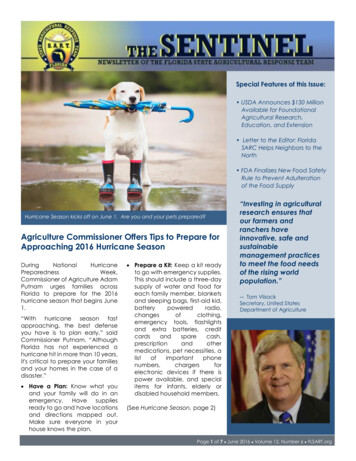
Transcription
Special Features of this Issue: USDA Announces 130 MillionAvailable for FoundationalAgricultural Research,Education, and Extension Letter to the Editor: FloridaSARC Helps Neighbors to theNorth FDA Finalizes New Food SafetyRule to Prevent Adulterationof the Food SupplyHurricane Season kicks off on June 1. Are you and your pets prepared?Agriculture Commissioner Offers Tips to Prepare forApproaching 2016 Hurricane issioner of Agriculture AdamPutnam urges families acrossFlorida to prepare for the 2016hurricane season that begins June1.“With hurricane season fastapproaching, the best defenseyou have is to plan early,” saidCommissioner Putnam. “AlthoughFlorida has not experienced ahurricane hit in more than 10 years,it's critical to prepare your familiesand your homes in the case of adisaster.” Have a Plan: Know what youand your family will do in anemergency. Havesuppliesready to go and have locationsand directions mapped out.Make sure everyone in yourhouse knows the plan. Prepare a Kit: Keep a kit readyto go with emergency supplies.This should include a three-daysupply of water and food foreach family member, blanketsand sleeping bags, first-aid y tools, flashlightsand extra batteries, tions, pet necessities, alistofimportantphonenumbers,chargersforelectronic devices if there ispower available, and specialitems for infants, elderly ordisabled household members.“Investing in agriculturalresearch ensures thatour farmers andranchers haveinnovative, safe andsustainablemanagement practicesto meet the food needsof the rising worldpopulation.”― Tom VilsackSecretary, United StatesDepartment of Agriculture(See Hurricane Season, page 2)Page 1 of 7 June 2016 Volume 12, Number 6 FLSART.org
Hurricane Season (continued) Stay Informed: Keep up-to-date on thelatest weather information. Watchlocal news and weather, listen to aweather radio or keep updated onyour computer or smartphone. Find Shelter: Research the location ofhurricane shelters before the seasonstarts. Know if you can take a pet ornot. Ensure any livestock or otheranimals have at least a three-daysupply of food and water.In addition to these tips, keeping your foodand water supply safe is one of the mostimportant things you can do during adisaster. Keep an appliance thermometer inyour fridge and freezer so you can getan accurate temperature readingeven if the power is off. A freezershould be at or below 0 F and thefridgeat40 F. Store food on shelves high enough sothey will not be contaminated in caseof flood. Have coolers on hand to keep food coldif the power is out more than four hours.Keep the fridge and freezer doors closedas much as possible. Discard perishables, such as meat, fish,cheese, milk, eggs, leftovers and deliitems, if the power is out more than fourhours. Use bottled water if you are concernedabout your water supply. If you don'thave bottled water, boil water and let itcool before storing to drink.Duringanemergency,theFloridaDepartment of Agriculture and ConsumerServices is responsible for providingnecessary food and water supplies andsupporting protection of animals and pets.In addition, the department's Florida ForestService, made up of a vast network ofpersonnelandequipment,assistsemergency responders in ensuring Floridiansare safe and that they receive thenecessary supplies during an emergency.For more information and tips on hurricanepreparedness, visit the National WeatherService's website.USDA Announces 2.4 Million in Available Funding to Relieve VeterinaryShortagesThe U.S. Department of Agriculture’s (USDA) National Institute of Food andAgriculture (NIFA) recently announced 2.4 million in available funding torelieve veterinarian shortage situations through education, extension andtraining as well as support for veterinary practices in designated shortageareas. vThis funding is was authorized by the Veterinary Services GrantProgram (VSGP) in the 2014 Farm Bill.“These funds support activities for veterinarians and veterinary technicians,helping them gain the specialized skills to address shortages in parts of thecountry,” said NIFA Director Sonny Ramaswamy. “Funds are also availablefor establishing or expanding veterinary practices in underserved ruralareas.”Compete information may be found at rtagesPage 2 of 7 June 2016 Volume 12, Number 6 FLSART.org
USDA Announces 130 Million Available for FoundationalAgricultural Research, Education, and ExtensionThe U.S. Department of Agriculture(USDA) last month announced that 130million in funding is available for research,education, and extension projects tosupport sustainable, productive andeconomically viable plant and animalproduction systems, including certifiedorganic production.This funding is available through theAgriculture and Food Research Initiative(AFRI) Foundational Program, authorizedby the 2014 Farm Bill and administered byUSDA’s National Institute of Food andAgriculture (NIFA).“Investing in agricultural research ensuresthat our farmers and ranchers haveinnovative,safeandsustainablemanagement practices to meet the foodneeds of the rising world population,” saidAgriculture Secretary Tom Vilsack. “Inaddition, studies have shown that everydollar invested in agricultural researchnow returns over 20 to our economy.”Established by the 2008 Farm Bill and reauthorized in the 2014 Farm Bill, AFRI is thenation's premier competitive, peerreviewedgrantsprogramforfundamental and applied agriculturalsciences. In the seven years since AFRIwas established, the program has led totrue innovations and ground-breakingdiscoveries in agriculture to combatchildhood obesity, improve and sustainrural economic growth, address wateravailabilityissues,increasefoodproduction, find new sources of energy,mitigate the impacts of climate variabilityand enhance resiliency of our foodsystems, and ensure food safety.This request for application (RFA) alsoincludes research topics proposed to befunded equally by eligible national andstate commodity boards and NIFA, asauthorized by the 2014 Farm Bill.Commodity board priority topics includethose proposed for the plant breeding foragricultural production program area,improving the food safety program area,as well as 3 million for the CriticalAgriculture Research(CARE) program area.andExtensionAlso, 2 million in funding is available forthe Exploratory Research Program (ERP)to address critical and emerging issues.NIFA is offering the Educational LiteracyInitiative through the AFRI program tosupporteducation,trainingandworkforce development through the preand postdoctoral fellowships program,research and extension experiencesprogram for undergraduate students,and professional development forsecondaryschoolteachersandeducational professionals.Finally, the AFRI Foundational program ispiloting a “Distributed Peer Review”process,amodifiedpeer-reviewapproach intended to improve peerreview efficiencies for three selectprogram area priorities while maintainingthe quality and integrity of the reviewprocess. Additional information on thedistributed peer review process isavailableonthe NIFAwebsite.Application submission deadlines vary byprogram. To view the RFA, visit the NIFAwebsite.For more information, please foundationalPage 3 of 7 June 2016 Volume 12, Number 6 FLSART.org
Enrollment Open: Multiple Levels for Small Animal Emergency ShelteringThe Florida State Animal Response Coalition has upcoming opportunities for theirAwareness Level and Operations Level Small Animal Emergency Sheltering.When disaster strikes, the team of trained volunteer responders will be there toshelter and protect Florida's companion animals.This Awareness Level class gives students the knowledge necessary to work in anemergency animal shelter. This class provides expertise and practical experiencerequired to become a professional disaster animal responder. The Awareness LevelSmall Animal Emergency Sheltering class is certified by the Florida Department ofEmergency Management and is required to respond in Florida to help companionanimals during a disaster.Thenewjobjoboptions,in additionto leadershipskills and team leadThe OperationsOperations LevelLevel ns,in mationcoveredinFL-003-RESPandICS-100courses.These earlierleadership skills and team lead opportunities. This course expands upon overed in FL-003-RESP and ICS-100 courses. These earlier courses are prerequisitesfor FL-607-RESP.Course topics include: Personal Preparedness, Overview of the Incident Command System, DeploymentPreparedness, Assisting in Shelter Set Up, Daily Care and Feeding, Proper Cage Cleaning and Disinfection, AnimalBehavior, Stress Management, Zoonotic Diseases, and Personal Safety.For more information about the courses, and to register, please visit: http://flsarc.org/Training.html.June 5 Course – Clearwater, FL (Awareness Level)When: Sunday June 5, 2016 from 8:00 AM to 6:00 PM EDTWhere: Metzler Veterinary Hospital, 2720 Summerdale Drive, Clearwater, FL 33761June 25 Course – Naples, FL (Awareness Level)When: Saturday June 25, 2016 from 8:00 AM to 6:00 PM EDTWhere: Collier County Domestic Animal Services, 7610 Davis Blvd., Naples, FL 34104August 6,7 Course – Naples, FL (Operations Level)Details: For information, email pamburnssarc@gmail.comPage 4 of 7 June 2016 Volume 12, Number 6 FLSART.org
FDA Finalizes New Food Safety Rule toPrevent Adulteration of the Food SupplyThe U.S. Food and Drug Administration has finalized a new foodsafety rule under the landmark, bipartisan FDA Food SafetyModernization Act (FSMA) that will help to prevent wide-scalepublic health harm by requiring companies in the United Statesand abroad to take steps to prevent intentional adulteration ofthe food supply.Stay up-to-date ofall Florida StateAgriculturalResponse Teamnews andinformation atwww.FLSART.org!While such acts are unlikely to occur, the new rule advancesmitigation strategies to further protect the food supply.Under the new rule, both domestic and foreign food facilities,for the first time, are required to complete and maintain awritten food defense plan that assesses their potentialvulnerabilities to deliberate contamination where the intent is tocause wide-scale public health harm.Facilities now have to identify and implement mitigationstrategies to address these vulnerabilities, establish food defensemonitoring procedures and corrective actions, verify that thesystem is working, ensure that personnel assigned to thevulnerable areas receive appropriate training and maintaincertain records.A webinar is planned for June 21, 2016 to present key pieces ofthe final rule.For More Information Intentional Adulteration Final Rule Fact Sheet Federal Register Notice Food Safety Modernization ActPage 5 of 7 June 2016 Volume 12, Number 6 FLSART.org
Letter to the Editor: Florida SARC Helps Neighbors to the NorthHello, Michael:Our team at SARC has a story to share about the recent classes we did in Savanah, GA (ChathamCounty), and also about upcoming classes we are doing in South Carolina in June. These stateswant to build their own companion animal response teams and will be using the SARC training toaccomplish those goals.Needless to say, we are very excited to have our neighbors to north on the same program becausewe can’t do this alone. It will make aiding each other in emergencies very consistent and seamless.The story below is from the Chatham County newsletter. It is written by Meredith Ley, the PublicInformation Officer with Chatham Emergency Management Agency.Sincerely,Consie von GontardChatham County, Georgia Seeks Pet Evacuation Training Assistance fromFlorida SARCBy Meredith LeyWhen an evacuation order is issued for ChathamCounty, the Evacuation Assembly Area (EAA) will beactivated to assist members of the public and theirpets who do not have reliable transportation out oftown.Appropriate staffing at the pet evacuation area hasalways been a major concern in regards to petcheck in procedures, registration, vaccination andloading. Animal Control and the Humane Societyboth are responsible for evacuating their ownshelters and simply will not have enough staff to assistwith pet evacuations of the general public at theEAA. This year, the Chatham EmergencyManagement Agency decided to do somethingabout it.We are proud to announce the First graduating classof the Chatham Animal Response Team. Together,team members have completed approximately1,000 hours of training to become the first deployablevolunteer team in the state of Georgia. This victorywould not be possible without the help of the FloridaState Animal Response Coalition.As the first and only animal response group to haveplans approved by FEMA, the Florida SARC membersare truly leading subject matter experts.They traveled to Savannah for three weekendsessions to train Chatham County citizens on all-hazard disaster preparation, planning, training,response, recovery and sheltering during animalemergencies.The training consists of three levels: Introduction,Advanced and Train the Trainer. Of the original group,30 are approved to deploy, 18 advanced to incidentmanagers and 12 are approved for training futurevolunteers. To help CART members gain experience,they are encouraged to volunteer with area sheltersand rescue organizations.(See SARC Partnership, page 7)Page 6 of 7 June 2016 Volume 12, Number 6 FLSART.org
SARC Partnership (continued)Please login andupdate yourmembershipinformation online at:http://flsart.orgNow, when a hurricane, fire, tornado or other disaster threatens ourarea, the Chatham Animal Response Team (CART) will be there toassist the animals that rely on us. CART is organized under ChathamEmergency Management and utilizes the principles of The IncidentCommand System (ICS). Thanks to Florida SARC, our volunteers arenow able to not only exercise pet emergency response, some havebecome certified trainers and have the ability to train other teamsthroughout Georgia.The Florida SARC is an invaluable resource for Chatham County andwe are so proud to have them as emergency response partners.Meredith Ley, Public Information OfficerChatham Emergency Management AgencySavannah, GeorgiaAbout The SART SentinelThe SART Sentinel is an e-mail newsletter prepared monthly by the members of the Florida State AgriculturalResponse Team. Past issues of the Sentinel are archived on the Florida SART Web Site, www.flsart.org.If you have a story or photo that you would like to have considered for publication in the SART Sentinel, pleasecontact the editors.Editor: Michael T. Turner, The Turner Network, LLC (www.TurnerNetwork.com) under contract with the FloridaDepartment of Agriculture & Consumer Services, Division of Animal Industry.Email: flsart@turnernetwork.comAssociate Editor: Dr. Greg Christy, Florida Department of Agriculture & Consumer Services, Division of AnimalIndustry.Email: gregory.christy@freshfromflorida.comPage 7 of 7 June 2016 Volume 12, Number 6 FLSART.org
shelters and simply will not have enough staff to assist with pet evacuations of the general public at the EAA. This year, the Chatham Emergency Management Agency decided to do something about it. We are proud to announce the First graduating class of the Chatham Animal Response Team. Together, team members have completed approximately


